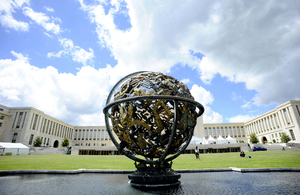ECOSOC Humanitarian Segment: UK statement
This UK statement was delivered at the ECOSOC Humanitarian Segment on 21 June 2017.

The ECOSOC Humanitarian Segment takes place at the Palais des Nations in Geneva
No-one here can be left unmoved by the unprecedented volume of crises occurring in the world. The very real threat of four famines in 2017 means millions more are at risk. These situations are overwhelmingly man-made - driven by conflict, broken politics and instability; exacerbated by environmental factors and a lack of respect for international humanitarian law.
In South Sudan, Somalia, Yemen and north east Nigeria, drought and conflict are pushing families to the brink of starvation. There is no end in sight to the six-year conflict which has ripped Syria apart. These are urgent and severe crises with more than 20 million people facing the risk of dying from starvation or attacks because of war. We must do more to protect the most vulnerable: people with disability, younger and older people, and those exposed to gender-based and sexual violence, particularly women and girls. We must also do more to end the scourge of modern slavery, tackling organised crime and people trafficking.
The global humanitarian system, of which we are all a part, saves millions of lives. Everyone in this room has a role to play and we should all be proud of the work we do. But the system as it stands cannot cope. We need radical change, innovation and reform. It is no longer enough to react when crises happen. We need a system which, as well as providing immediate assistance, is building resilience, so that countries are better prepared, and providing effective long-term solutions, to slow the trend of crises becoming protracted.
The UK is one of the world’s biggest humanitarian donors. We are one of the largest providers of multi-year and unearmarked funding. When disaster strikes, whether it is natural or man-made, we are among the first to act. Just this weekend, we confirmed more financial support for Somalia and Ethiopia to help them address the food crises there - to save lives, stop the famine and deliver urgent humanitarian aid.
We will shortly publish the UK’s new Humanitarian Reform Policy which will reaffirm the UK as a global leader in responding to emergencies and reforming the international humanitarian system. The policy sets out five key messages:
First, we will maintain our steadfast support for international humanitarian law, humanitarian principles, and protecting the most vulnerable.
Second, we will invest in the UK’s world-class teams of experts for immediate response to natural disasters. Our response will be bigger, better and faster in future.
Third, we will focus on helping other countries prepare for humanitarian crises and building resilience, and on resolving conflicts.
Fourth we will bring together humanitarian and development funding to support education, jobs and social protection within protracted crises where more people are being displaced for longer.
And finally we will push for radical reform of the international humanitarian system; greater efficiency and more use of innovation - including working with the private sector on insurance and risk management and the greater use of cash-based approaches.
We will also continue to push for strong outcomes from the Comprehensive Refugee Response Framework and Migration Compact: protecting people on the move; ensuring safe, regular and orderly migration; and that refugees and host communities have access to basic services, education health and jobs. Increased trade should drive economic development and opportunities for all. We must leave no one behind and deliver the 2030 Agenda.
But, we must work with others if we are to drive change that places people affected by crises at the centre of humanitarian action. At the 2016 World Humanitarian Summit we agreed a clear vision for a radically improved humanitarian system where our collective responses are faster and more effective. The UK will deliver on its commitments against the Grand Bargain and we call on others to do the same.
The UK will continue to use its resources to address the conflicts and instability which are the drivers of crises. But we must also seek political solutions and an end to the repeated cycles of violence. We must bring a viable future and hope to those affected by ongoing crises in places like Yemen, South Sudan and Syria.
I am sure that there will be many conversations on this theme over the next few days, and we are looking forward to taking part in those, and working with you all to ensure that our humanitarian system can continue to meet growing humanitarian need.